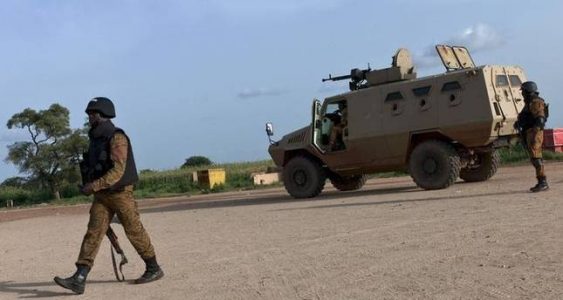
New massacres by the Islamic terrorist groups in Burkina Faso
Suspected Islamist armed groups in Burkina Faso killed at least 90 civilians in 3 attacks on villages in late January 2020 that forced thousands to flee, Human Rights Watch said. The attacks, between January 17 and 25, accelerated government plans to create a new militia force, raising concerns of future abuses.
The killings in Rofénèga, Nagraogo, and Silgadji villages occurred amid a surge in armed group attacks in the center and north of the country and the growth of Islamist armed groups linked to Al-Qaeda and to the Islamic State in the Greater Sahel (ISGS). The violence had displaced over 775,000 people by the end of March. Human Rights Watch is also investigating the February 16 attack on Pansi village, allegedly by armed Islamists, which left over 20 civilians dead.
“The massacre of scores of civilians by Islamist armed groups shows their utter disregard for human life,” said Jonathan Pedneault, crisis and conflict researcher at Human Rights Watch. “Armed group leaders should immediately stop and denounce such attacks against civilians.”
Human Rights Watch previously documented Islamist armed group attacks that killed more than 250 civilians between April and December 2019, as well as dozens of cases in which government security forces summarily executed men in their custody for their alleged support of the groups, most recently during an incident on April 9 in Djibo.
Human Rights Watch interviewed 13 witnesses to the Nagraogo and Rofénèga killings in Burkina Faso’s capital, Ouagadougou, and in Kaya, in late January. Two witnesses to the Silgadji killings were interviewed by telephone.
No one has claimed responsibility for the attacks, but all 15 witnesses said they thought the attackers were members of Islamist armed groups because their method of attack and choice of targets were similar to previous attacks by these groups.
They said that the gunmen, dressed in black or military garments and wearing turbans, rode two-by-two on motorcycles into village marketplaces. They seemed to target adult men on the basis of their ethnicity because virtually none of the victims were Fulani, the ethnicity of many armed Islamists. In Nagraogo, witnesses saw attackers flying a black flag, a symbol of the Islamic State (also known as ISIS).
In two of the villages, witnesses said, the population had earlier fled because of growing insecurity, but government authorities had urged them to return home after the army provided security assurances.
A 15-year-old girl from Rofénèga told Human Rights Watch she witnessed the killing of her 20-year-old brother on January 17. “He had mental health issues,” she said. “When he heard the gunshots, he tried to flee to the bush, but they intercepted him and killed him.”
People with disabilities were among those unable to escape the attackers. A 40-year-old woman with a physical disability said that on January 20 in Nagraogo village, she hid in her home while her family escaped to safety. “I heard gunshots and was sad and scared,” she said. “I felt death, because I couldn’t run.”
A day after the January 20 attacks on the neighboring villages of Nagraogo and Alamou, which killed at least 36 people, the Burkina Faso parliament passed a law creating local militias, Groups of Volunteers for the Defense of the Homeland. The law would create groups of “Volunteers” by recruiting, training, and equipping civilians to defend their communities. They are to operate under the authority of the Burkina Faso Defense and Security Forces (Forces de Défense et de Sécurité, FDS).
But the new law could leave communities more vulnerable to attacks by Islamist armed groups, Human Rights Watch said. In previous months, armed Islamists have on several occasions targeted civilians for their alleged support of the military or local Volunteer forces.
In the village of Gasseliki, armed Islamists killed 20 civilians in January 2019 in apparent retaliation for seeking to establish a self-defense force. More recently, a witness to the January 25 Silgadji killings said that during the attack, armed Islamists accused the community of seeking support from the military to establish a group of Volunteers.
The government’s plans to empower militias by institutionalizing the Volunteers also raises concerns that such groups will commit serious abuses. Existing Burkina Faso self-defense groups, such as the Koglweogo, have committed numerous abuses. On March 8, members of the Koglweogo allegedly killed at least 43 Fulani in 3 villages of the Sahel region.
Abuses by all armed groups in Burkina Faso’s ongoing conflict have largely gone unpunished, highlighting the failure and limitations of the Burkina Faso justice system to ensure accountability for victims of abuses and likely prompting reprisal killings.
Burkina Faso and its international donors – particularly France and the European Union – should support efforts to address growing tensions between ethnic communities, improve efforts to hold accountable those responsible for serious crimes, and impartially protect civilians at risk. Burkina Faso’s international partners should urge the government to take all necessary steps to ensure that the Volunteer self-defense force it plans to mobilize is properly trained, regulated, and held to account if members commit abuses.
All those responsible for deliberate killings of civilians and other serious violations of the laws of war may be prosecuted for war crimes. Burkinabe commanders may be held accountable for war crimes for grave abuses committed by forces under their command, including Volunteers. International partners of Burkina Faso providing support to the military, including those supporting the G5-Sahel Force, should ensure that weapons and other materials provided to the Burkinabe military are not transferred to abusive militia forces.
“Arming civilians without adequate training or government control is a recipe for increased abuses and intercommunal conflict,” Pedneault said. “Instead of countering communal tension, the Burkina Faso government risks exacerbating the problem by creating militias that could well turn their guns against other civilians.”
Source: Eurasia Review





